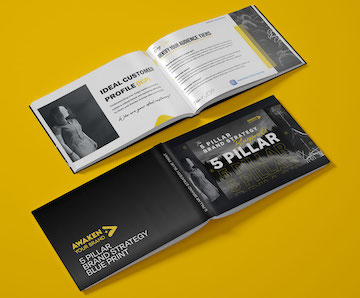I am about to share with you a strategy that would make a huge difference to your success as a business owner and entrepreneur. The few minutes you spend reading this information would be the best investment you would have made for your success. Guaranteed!
Do you do business with businesses or people? If you think about it, people are the building blocks of the business world. Consumers typically buy from people – even if it is online. Of course if you are buying from Amazon or other such internet stores, you do not deal with people.
However, in your business, you would need to look at a strategy that includes building your personal brand through a focused brand image campaign. If you focus simply on your business brand, then you are not insured against pitfalls of your business and the economy. To illustrate this point, I will talk about two business owners, Jason and Nisha.
Jason’s Story
Jason contacted me a while ago. He had a business idea and wanted help with launching it. During the course of discovery, I realized that Jason had actually built and run a very successful real estate agency in Tampa, Florida. However, this business went belly up in the most recent economic crisis and Jason had to let go of his 20 strong teams, apply for a chapter 11 and found himself eye deep in personal debt. Jason was not the only one affected in the crisis. However, he found himself with nothing to show from all his years in business.
It took him over 2 years, working for someone else, to be able to stand up on his feet again and think of his next venture.
Nisha’s Story
For another client, Nisha, we helped create her brand identity a few years back. Armed with a degree in interior design, Nisha had set up a business catering to affluent Long Island homeowners, helping them create stunning interior designs. When the crisis hit, Nisha’s business was affected too. People stopped spending money on interior design and since Nisha’s business, just like Jason’s, was limited to a geographic area, sales simply dried up.
However, from the beginning, Nisha had done something that Jason failed to do – spent time developing her personal brand. She established herself as an authority in her field. She had a personal website where she blogged about interior design. She wrote informative articles about her field. She shared the news. She made creative suggestions. She was also quite active on social media networks, connecting with and the engaging audience interested or related to her focus topic.
When the crisis hit and Nisha’s business was affected, she did not have to close it down or apply for chapter 11. Her personal brand helped her continue getting projects and sales. All she had to do was adjust her service offering. She changed her business model to be non-geographic and instead targeted the whole of the United States, offering her expertise and skill to homeowners remotely using communication technology such as Skype and Google Hangouts. In fact, the crisis was a blessing in disguise since it forced her to expand her horizons which then lead to business growth.
Imagine, now if Jason had implemented the “personal branding” strategy too. If Jason had set aside a portion of his time, effort and money towards building and nurturing his personal brand along with his business brand, then when times were tough, Jason could have started reaching out to his network and use his personal brand to continue selling properties.
Of course, I understand that this is an oversimplified narrative of these two businesses and their situations. But I believe you get the point and understand the importance of factoring in an insurance for your business success.
« 60 Free Design Resources for Entrepreneurs | Use Of Color In Creating Logo Designs »
How To Create A Powerful Personal Brand
Building a personal brand is surprisingly easy. At the very least, you would need to the following:
1) Register your personal name domain
It is critical that you register a domain of your name. Typically, a domain of your full name is ideal. If that is not available and some one else has already registered it then try and find variations and alternatives that make sense. Your personal name is as important as your brand name.
2) Invest in a personal website
Once you have secured your personal domain name, invest in getting a professional website designed and hosted with a CMS (Content Management System) system in place. This website should be a DIY (Do It Yourself) one. You should be able to manage it with out technical help from a web designer. You should be able to create new pages on the fly and publish them on to the web easily.
Your personal website is an extension of you – online. It should be separate from your business that enables you to express who are and build your online personality. I have included a few options for your website in the next point.
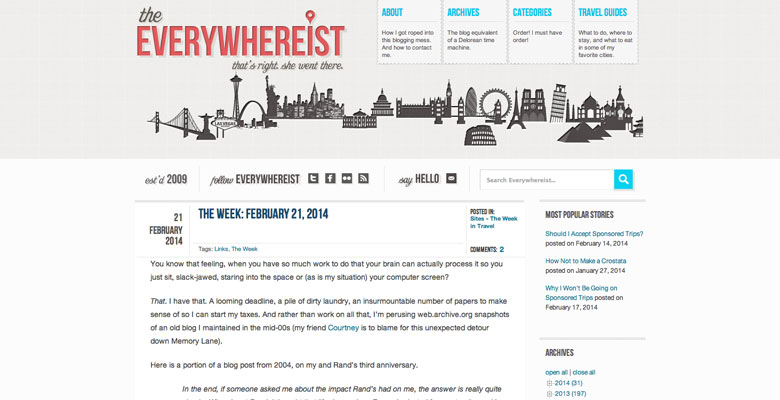
3) Set up a personal blog
At least once a week (and preferable more, if possible), you would need to spend some time writing on your blog. You can write about both business and non-business topics but if you do write about your business or your market sector, then you should do so from your personal perspective. Strictly speaking, I would try and limit your business articles and posts to your company blog.
There are many decent CMS options on the market such as:
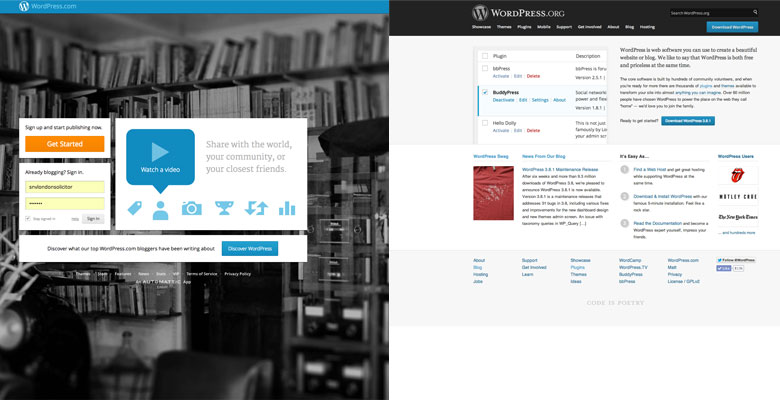
WordPress.com or wordpress.org – You can either get a managed website on WordPress itself or you can use WordPress as the website base on your hosting. The second option is the preferred method since you own the website and can do with it as you please. Hosting on WordPress itself means you are tied to the platform and their terms and conditions.
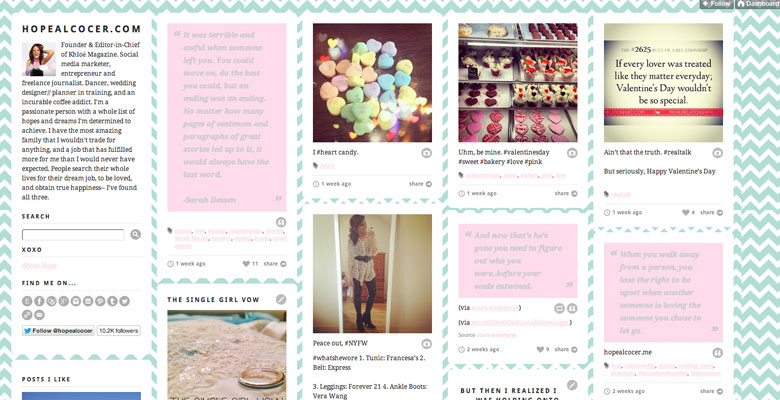
Tumblr.com – is very easy to use platform but is more of a social network than a blog. Also it is owned by Yahoo which is not such a great thing since it is likely that Yahoo would be introducing adverts onto the platform.
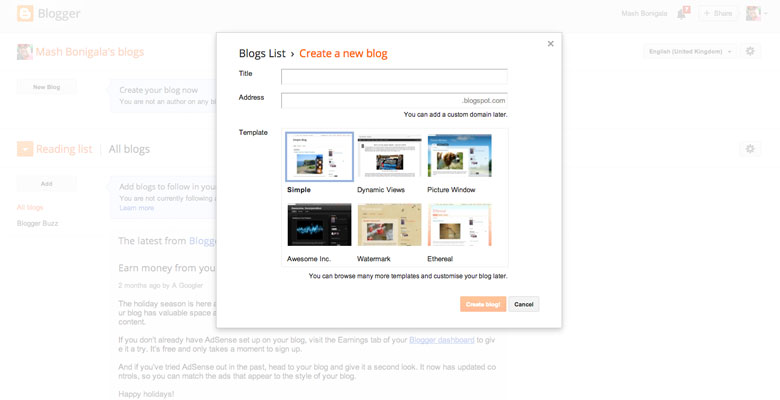
Blogger.com – This platform is owned by Google and is very easy to set up and get started but quite unsophisticated when it comes to customization and enhancing the layout and look and feel.
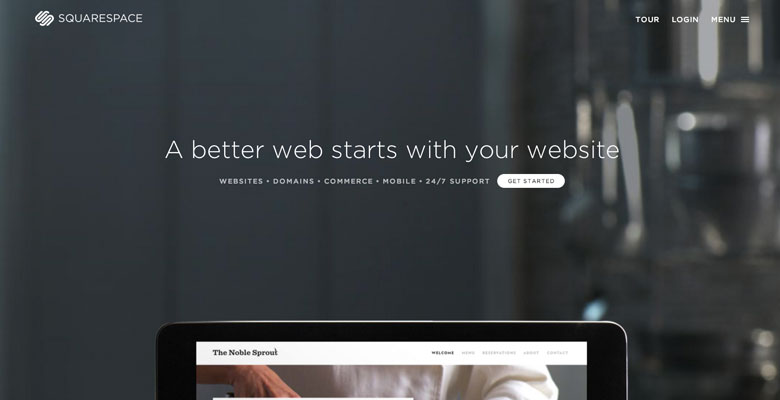
SquareSpace.com – Quite a slick and stylish platform with some awesome features. However, it is pricey and perhaps better for a business blog.
4) Show your personality
On your personal blog, do not be afraid to let people who you are and how you think. You should try and show your worldview and your personal philosophy. In the past, there used to be a myth about not being overly personal online because it would be unprofessional or not good for your business. But that is old thinking now. Your clients and customers would be happy to know your personal side. This would build trust and rapport with your prospects.
Do not worry about the portion of audience would be put off by your personality or personal views. Trying to be vague about your opinions and views would not help your personal brand. Playing safe won’t get your any where. Of course you have to be careful and politically correct and with in reasonable confines of etiquette and decency.
Remember that you can not please everyone. Once you have completed the critical process of identifying your target market, you will have a better understanding of the world view of your customer segment. You can then sift through and find out topics that resonate with them. Write about these topics and add your own twist to them.

5) Educate People
Try to share your knowledge with your market segment. Educating people is a powerful and effective way of becoming an authority in your field. Being generous with sharing your experience that actually benefits people can go long way in ultimately drawing in clients.
Typically people think that by sharing their knowledge and experience, their service or offer would become redundant and they would not get any customers. But that is a limiting belief. Sharing your knowledge makes you the go-to person in your sector. While your competition is close-mouthed and tight-lipped, you will be a breath of fresh air and your target audience will soon gravitate towards you and in fact, word of mouth referrals will become a norm.
Suppose you are a clothing label, you can write a post about the latest award events (such as the Oscars or Emmy) and give your own verdict and fashion tips. You can also write a post full of tips and tricks on how to be fashionable while traveling and so on. Write posts on color matching. Advice your readers on what to wear for which occasion and so on.
If you run a beauty salon or a cosmetic business, you can post articles with advice on how to take care of your skin or your hair. Offer actionable techniques on applying makeup or mascara.
Another great strategy is to answer questions on popular platforms such as Quora.com, Yahoo Answers etc. Search for hashtags that align with your field of expertise and business. Set up a daily or weekly schedule to go through the questions and see if you can answer a few. The important thing is to make sure the answers are authentic and add value. Do not simply post replies that are just a rehash of what others may have already posted. Your contribution should enhance your personal brand. Half-baked or amateur answers may, in fact, tarnish your reputation.
6) Get on social media
The next most critical activity would be embracing social media. The present and future are all about social media. Having a strong presence on social media leads to both personal and business success. I will not go too much into the pros and cons of social media in this article but I can not emphasize enough how critical social media is to your success.
The first step is to pick one or two social media channels to focus on. Here are some pointers to which network may align with your business goals:
Google+ – By far the best social media, in my opinion, for connections and engagement. You can connect with people from your market segment as well as people who share your views and interests. It is great with one way following – unlike Facebook – which means you can follow anyone and anyone can follow you without a permission-based access.
The main advantage of Google+ is that it is part of the Google network and search. Google is now implementing something called the “Authorship” which enables one to be authentic and get rewarded for it. By having an authentic presence on G+, you build your authorship reputation which will then help with Google search and being found by a wider audience group.
Facebook – There is not much to say about Facebook since I am sure you already have an account and know how it works and what it is good for. Since it is a closed system with permission-based connection system, it is harder to build a following. Here is another article I wrote on optimizing your Facebook campaigns.
Twitter – Everyone should have a solid presence on Twitter. It helps you create connections and enable you to get followers who would enhance your personal brand. Post interesting updates about what you are doing and reading on the internet. Focus on aligning your tweets with what you want people to associate your personal brand with. Here is an in-depth post on using Twitter to improve your brand.
Pinterest – A great new social network that is actually moving at tremendous speed. Like a photo or image, you see on the internet? Then pin it on Pinterest. Follow power users who pin images that pique your interest. Install a Pinterest browser plugin to make it easy to pin images. Make it a habit and over time it will become second nature. I wrote an article on using Pinterest for your business promotion but it is equally useful for personal brands.
7) Social Media Branding
The next step is to ensure your branding is consistent on all the social media channels. You need a professional looking personal logo, an avatar, and consistent cover images and backgrounds. Ensure that all the profiles are fully fleshed out with good titles, taglines and descriptions. Make sure the profiles are complete and that you verify these profiles with your personal blog and your business website. Establish clear authorship links to show the search engines that you are the author.
Spend time to distill your core values and create a unique and specific message style. This style has to be carried over to the status updates, the images, and links you share on these networks. Be consistent and your audience will come to recognize and expect your signature style.
Remember, you are a brand and hence you need to act accordingly.
8) Create Media Content
Finally, to really enhance your personal brand and take it to the next level, you need to invest in alternate media content venues such as a Youtube channel, an audio podcast or a webcast.
Put yourself out there and create videos – either personal vlogs or sector related ones and show the world who you are and get noticed. If videos are difficult to get started with, you can start a podcast where you can talk about issues that motivate and interest you.
Developing A Personal Brand That Works
What does a personal brand have to do with a business brand? Unfortunately, it can make all the difference. If you are associated with a company, either as employee or owner, and you make a bad choice during work time, that mistake will likely be held against you and the company. Here are five things to keep in mind when developing a personal brand that works with your professional one.
Twice the exposure means twice the views… if you play your cards right. Offering links back and forth between the company website and your own can develop get your name out to more people. However, these people may not be targeted viewers. Generally, your personal blog should be in the same genre as your business or a related one if link sharing is going to be successful.
Build contacts. While this may not be possible, it’s always good to begin building up a list of contacts before you even begin seriously business networking or blogging. This prevents the frustration many new people feel of performing for no audience. On the other hand, it can be difficult to build a following when there is nothing to follow, so don’t let a lack of public interest keep you from making decisions that are good for you and your business.
Build content. Whether your web presence is a fully featured website, a hosted blog, or a few social networking memberships, you will have to work, especially at first, at creating a web presence that is attractive, complimentary in color and style to your business’s branding, and accurate. Often all it takes are a few posts, but this can vary from business to business.
Keep it light. A personal web presence that is linked to your professional one can have much more personal information, but still nothing that you wouldn’t want shared with the world. After all, putting something on the internet is quite literally sharing something with the world. In general, light hearted things like jokes and updates are about as deep as you can go when your professional reputation is at stake.
Keep it clean. Modern consumers are looking to weed out the rats, so don’t embarrass yourself or your company with crude behavior or language. There is no reason to swear on any website, but especially not one that is linked to your professional image.
The five guidelines are by no means comprehensive, but they should give you a good idea of what kinds of behavior are expected of you and your employees once you begin to make links between your professional brands and your personal ones. By building a personal brand that is strong and respectable, you can bolster your business and make customers feel more at home with you. Building a personal brand that is less than ideal, on the other hand, can have a very negative impact both on you and your small business.
There is much more to personal branding and this post just scratches the surface. I hope this becomes a primer and helps you get on the path to greater personal and business success. It is never too late to get started and it is not as hard as you would imagine it to be. All the items listed above may seem too technical and you may consider yourself a computer newbie. But believe me when I say that once you start taking one step after another, things will become clearer and very easy.
Personal Branding Tips For Authors & Writers
Writers are creative people. Just like designers and artists and the myriad of other creatives out there. They just want to get on with writing and expressing their thoughts through words. Most writers and authors tend to cringe at the word “branding” and perhaps come to feel that they do not want to be a brand. They want to be themselves and be a genuine article.
If you are such an author or writer then you are not alone. However, branding is a critical element for your success. What you need is personal branding. Here are some great personal branding tips to help you create impact and gain more exposure for your writing – books, blogs etc.
Tip #1: Create Your Brand Personality
![]() To have a strong brand identity system, it is essential to start with your brand personality. This, in turn, depends on identifying your core values and your unique value proposition. What are your strengths? How are you perceived and how would you like to be perceived?
To have a strong brand identity system, it is essential to start with your brand personality. This, in turn, depends on identifying your core values and your unique value proposition. What are your strengths? How are you perceived and how would you like to be perceived?
A personal brand personality is a sum total of the core values, mission, goals and attributes that bring your UVP to the forefront. What are your guiding principles? What kind of emotional temperament do you have?
Questions, questions. Yes, identifying your brand personality is all about asking questions and looking deep into yourself to find the real you.
Tip #2: Create Your Personal Brand Story
![]() Every one has a story to tell. As an author you write stories all the time. Stories run the world and help us all connect with one another. Once you have identified your brand personality, it is time to identify your personal story of the journey from when you started writing to where you are today as a writer. If you feel that the story is not exciting enough, then you should what you do best – write your brand story to be exciting. I am not advocating lies. I am simply asking you to use your skill to write a compelling story that will connect with people.
Every one has a story to tell. As an author you write stories all the time. Stories run the world and help us all connect with one another. Once you have identified your brand personality, it is time to identify your personal story of the journey from when you started writing to where you are today as a writer. If you feel that the story is not exciting enough, then you should what you do best – write your brand story to be exciting. I am not advocating lies. I am simply asking you to use your skill to write a compelling story that will connect with people.
A personal brand story is really critical in your success as a writer and an author. Don’t get me wrong. Your writing skill and talent is of the utmost importance. But a strong brand story will gain the exposure you deserve and bring your writing in front of a larger audience.
Tip #3: Create Your Buyer Persona
![]() Understanding your target audience and identifying the core market is quite important in building an endearing personal brand. This may be easier than you think if you are already writing for a niche. If you have identified your primary buyer, great. If not then now is the time to start creating the profiles.
Understanding your target audience and identifying the core market is quite important in building an endearing personal brand. This may be easier than you think if you are already writing for a niche. If you have identified your primary buyer, great. If not then now is the time to start creating the profiles.
If you are targeting anyone that needs your writing services, your job will be much tougher. Contrary to what one may think, targeting every one out there is not the right thing to do. You must identify a primary target market. This will help craft your marketing message more precisely and enable the emotional connections that are so important for your success.
Tip #4: Target A Niche Market
![]() This leads from the previous tip in that, if you are writing anything for anyone and taking up any project that comes your way, it is not a sustainable strategy. You will become a generalist as opposed to a specialist. This means that you will always be working on smaller projects that probably pay you for your time rather than your expertise.
This leads from the previous tip in that, if you are writing anything for anyone and taking up any project that comes your way, it is not a sustainable strategy. You will become a generalist as opposed to a specialist. This means that you will always be working on smaller projects that probably pay you for your time rather than your expertise.
You need to identify and target a niche market. What fascinates you? Which industry or type of writing assignment excites you the most? Which assignment did not feel like work?
Working in a niche sector will, in the long run, bring you clients and projects that will pay more and pay for value rather than your time. Working in a niche will enable you to become an expert and an authority which is the next tip.
Tip #5: Become An Authority
![]() Once you choose a niche and start focusing all your time and efforts trying to write for that niche, the stage will be set for you to become an authority. Focus your energy in broadcasting the message that you work in that niche. Come up with a slogan or tagline that communicates this message. Create your visual identity that aligns with this message. Write a blog or create a podcast related to that niche. Let your voice be heard. Write white papers. Create Youtube videos.
Once you choose a niche and start focusing all your time and efforts trying to write for that niche, the stage will be set for you to become an authority. Focus your energy in broadcasting the message that you work in that niche. Come up with a slogan or tagline that communicates this message. Create your visual identity that aligns with this message. Write a blog or create a podcast related to that niche. Let your voice be heard. Write white papers. Create Youtube videos.
Becoming an authority is all about niche, focus and consistency. Once you become an authority in the niche, the prices you command for your work will be multifold. Sky is the limit.
Tip #6: Create Your Visual Identity
![]() Your personal logo, look and feel, website and messaging has to reflect the above attributes. Invest in getting a decent brand identity created. Your logo design must reflect your brand story and unique value proposition. Of course that is not to say that you must make your logo complex. Your logo designer must dig deep and distill the essence of your personal brand and then find a visual representation of that.
Your personal logo, look and feel, website and messaging has to reflect the above attributes. Invest in getting a decent brand identity created. Your logo design must reflect your brand story and unique value proposition. Of course that is not to say that you must make your logo complex. Your logo designer must dig deep and distill the essence of your personal brand and then find a visual representation of that.
You should go for a unique color that you can own in the market. Try and find a color palette that will be used consistently across all your media touch points. The same goes for typography and font. You must have a primary font that may be used in your logo and one or more secondary complimentary fonts that you use consistently on your website and social media channels.
Tip #7: Network Online
![]() Become active on social media channels. This would be a great way to network with peers in the industry. Networking leads to partnerships and opportunities. If you are focused on a niche and specialise in it, these partnerships would then result in work being referred to you. Generalists who can not handle specialist work will then start referring you for such projects.
Become active on social media channels. This would be a great way to network with peers in the industry. Networking leads to partnerships and opportunities. If you are focused on a niche and specialise in it, these partnerships would then result in work being referred to you. Generalists who can not handle specialist work will then start referring you for such projects.
To network effectively, remember to approach your interactions on social media from a selfless motive and intent. Selfish engagements online will lead you nowhere. Share and promote other’s work or posts. Praise when it is due. Recommend work you like.
Tip #8: Educate People
![]() One of the best ways to establish your personal brand and gain credibility is to share your knowledge and use your authority to educate people in your industry. Do not be afraid to share your processes, tools your use, strategies you employ to gain work and most importantly how to be a great writer.
One of the best ways to establish your personal brand and gain credibility is to share your knowledge and use your authority to educate people in your industry. Do not be afraid to share your processes, tools your use, strategies you employ to gain work and most importantly how to be a great writer.
Encourage young and upcoming writers. Answer their questions and offer advice. Write about writing in your blog. Encourage new entrants to contact you with questions. Always respond to them. Educating people is one of the most effective ways to not only establish your authority but also to keep your skills honed and sharp.
Tip #9: Write A Book On Writing
![]() Following from the tip above, this one may seem quite far fetched. But if you think about it, would it not be awesome to say that you had literally written the book on writing? Do what it takes to write a book and self publish it. Get it on Amazon and promote it.
Following from the tip above, this one may seem quite far fetched. But if you think about it, would it not be awesome to say that you had literally written the book on writing? Do what it takes to write a book and self publish it. Get it on Amazon and promote it.
Sales of the book would do wonders to your personal brand and can not only lead to additional revenue but will lead to more projects, speaking engagements etc.
Tip #10: Learn and Learn More
![]() To continue being a thought leader in your industry you must continue being a student. Educate your self and hone your skills. Develop new skills and experiment with your writing. Take on side projects that are different from your work engagements. You can also break the golden rule of going niche and venture into new segments now and then.
To continue being a thought leader in your industry you must continue being a student. Educate your self and hone your skills. Develop new skills and experiment with your writing. Take on side projects that are different from your work engagements. You can also break the golden rule of going niche and venture into new segments now and then.
Conclusion
I am not a writer but I love to write. I hope I have not done too badly with this item. As a writer, I would welcome your feedback and suggestions on the way I write. If you need any help with your personal branding strategy, reach out to me via our contact page or ping me on Twitter and I will be glad to help you out.

